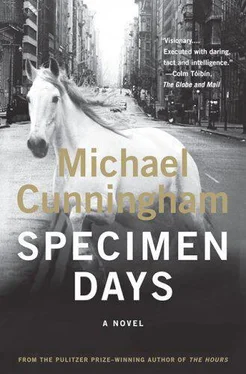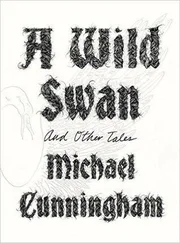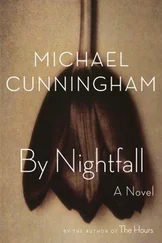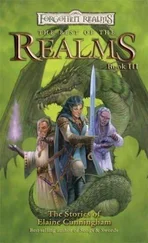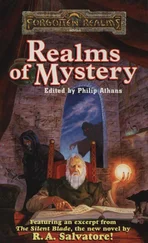Michael Cunningham - Specimen Days
Здесь есть возможность читать онлайн «Michael Cunningham - Specimen Days» — ознакомительный отрывок электронной книги совершенно бесплатно, а после прочтения отрывка купить полную версию. В некоторых случаях можно слушать аудио, скачать через торрент в формате fb2 и присутствует краткое содержание. Город: New York, Год выпуска: 2005, ISBN: 2005, Издательство: Farrar, Straus and Giroux, Жанр: Современная проза, на английском языке. Описание произведения, (предисловие) а так же отзывы посетителей доступны на портале библиотеки ЛибКат.
- Название:Specimen Days
- Автор:
- Издательство:Farrar, Straus and Giroux
- Жанр:
- Год:2005
- Город:New York
- ISBN:0-374-70515-1
- Рейтинг книги:4 / 5. Голосов: 1
-
Избранное:Добавить в избранное
- Отзывы:
-
Ваша оценка:
- 80
- 1
- 2
- 3
- 4
- 5
Specimen Days: краткое содержание, описание и аннотация
Предлагаем к чтению аннотацию, описание, краткое содержание или предисловие (зависит от того, что написал сам автор книги «Specimen Days»). Если вы не нашли необходимую информацию о книге — напишите в комментариях, мы постараемся отыскать её.
Specimen Days — читать онлайн ознакомительный отрывок
Ниже представлен текст книги, разбитый по страницам. Система сохранения места последней прочитанной страницы, позволяет с удобством читать онлайн бесплатно книгу «Specimen Days», без необходимости каждый раз заново искать на чём Вы остановились. Поставьте закладку, и сможете в любой момент перейти на страницу, на которой закончили чтение.
Интервал:
Закладка:
Among the coils of jewelry was a bowl, half hidden. It had been carelessly filled with gold-toned brooches, a strand of fake pearls, but the rim showed, pale and bright as the moon, decorated along its upper edge with symbols of some sort, which might have been flowers or sea anemones or stars. Junk, it was probably junk what else could it be, considering where it had ended up? and yet, it didn’t look like junk, even in the fluorescence of the shop window. It seemed to emit a faint but perceptible glow, like a wristwatch in the dark, though it was pure, pure white. It looked, from what she could see of it, like a displaced treasure, something genuinely rare, mistaken for dross. These things turned up every now and then, didn’t they? The da Vinci drawing slipped in among the botanical prints, the Melville letters stacked with old bills and yellowed shopping lists. Could it possibly be Chinese? Could it be something Simon might want for his collection?
She went into the shop. It smelled of mold and sweaty wool, with an undercurrent of sandal wood incense. It was more like someone’s messy closet than a store. There were piles of shoes, a sagging clothes rack jammed full of old jackets and sweaters, a round cardboard bin that proclaimed, in scrawled Magic Markered letters, that its contents could be had for fifty cents apiece.
A woman sat at the rear, behind a glass counter. She was as wan and worn-looking as her merchandise. Her gray hair hung to her shoulders, and her face was vague, as if someone had drawn the features of a woman onto the front of her head and then tried to erase them. Still, she was queenly, in her ruined way. She sat erect, with a vase full of peacock feathers on her right and an oval mirror on her left, like a minor queen of the underworld, ruler of the lost and inconsequential.
Cat summoned a regal bearing of her own. I have no intention of slipping any of your sorry shit into my handbag.
“Hello,” the woman said, without a hint of malice or suspicion. She might have been sitting here among these things for years, waiting to see if tonight someone would finally come in.
“Hello,” Cat said. Regular voice. “I wonder if I could see that bowl in the window.”
“Bowl.”
“Yes. It’s right there. It has jewelry in it. Is it for sale?”
“Oh, the bowl. Just a minute, please.”
The woman stood. She was violently thin. She wore a lank dress covered in roses and some sort of purple shawl over her shoulders. She went to the window, leaned over, and dumped the jewelry out of the bowl. She brought it to Cat.
“Here it is,” she said.
The bowl was, in fact, something. Anyone could see it. It was about the size of a sparrow’s nest, luminous; it seemed to amplify the room’s stagnant illumination. Cat took it from the woman. It was lighter than she’d expected it to be, almost weightless. Even up close, she couldn’t tell what the symbols painted along its outer rim were meant to be. They didn’t look Chinese. Each was different from the others, but all were variations on the same design: a circle that emanated slender spokes, some straight and some wavy, some long and some short.
“It’s beautiful,” Cat said.
“I don’t know where it came from.”
“Is it for sale?”
“It’s ten dollars.”
Cat paused, briefly and absurdly doubtful if it was really as lovely as it seemed, would it cost so little?
“I’ll take it,” she said.
She gave the woman ten dollars and waited while she wrapped the bowl in a sheet of newspaper. Cat thought she would give the bowl to Simon. She’d never bought him anything like this; she’d only bought him books, and once a tie he’d admired when they were in Barneys together. She’d never before given him anything that involved her own sense of beauty, anything meant to join the carefully selected prizes he kept up there in his aerie. She hadn’t dared to.
The woman slipped the wrapped bowl into an old plastic Duane Reade bag. She gave it to Cat.
“Enjoy it,” the woman said. “Thank you,” Cat answered. “I will.”
As she left the shop, she heard a clatter. Horse’s hooves, galloping. She froze. Here it came, toward her. A bay horse, riderless, running up Broadway. For a moment, the world tipped on its axis. Something dreadful and impossible was happening. And then the world righted itself again. It was a runaway horse. It was only that. A car pulled over to avoid it, another laid on its horn. The horse was running up the middle of the street, its hooves sparking on the pavement. After a moment a patrol car appeared in pursuit, lights flashing and siren blaring. There was a stable down there, wasn’t there? Where the police horses were kept. Cat stood sheltered in the doorway of the shop. The horse ran by. It was beautiful, no denying it. Black mane fluttering, brown flanks glossy and strong. An ancient and marvelous manifestation, slipped through a dimensional warp. It did not appear to be frightened. It was only running. The squad car came after, flashing its lights. The horse galloped on, pursued by the car.
The woman from the store came out and stood beside Cat. “Terrible,” she said.
“My God.”
“It’s the second time this month.”
“Really?”
“Something’s spooking them,” the woman said. “This didn’t used to happen.”
“What do you think it is?”
“Something in the air. Animals know.”
Cat stood with the woman, watching the horse disappear up Broadway amid screeching brakes and car horns, carrying with it the steady hollow sound of its hooves and the wail of the siren. What would happen when it got to Canal Street?
“You didn’t drop the bowl, did you?” the woman asked.
“What? Oh, no.”
She was, in fact, holding the bowl close to her breasts, as if to protect it, or as if she’d believed in some reflexive way that it could shield her.
“Good.”
The shop woman nodded. It seemed for a moment that the incident had been meant to deprive Cat of a ten-dollar bowl and that the woman was glad to know things hadn’t turned out badly after all.
The two women watched the horse as it receded. There was no sound of collision. The horse stopped at Canal Street, reared halfway on its hind legs. The cops jumped out of their car. There was a noisy confusion of people and lights, corner of Broadway and Canal, and above it all the horse’s head, tossing. There was a flash of the horse’s eyes and teeth, a string of its dangling saliva, bright in the streetlight.
“Wow,” Cat said.
“Something’s spooking them,” the woman said.
“I guess so,” Cat answered.
At nine (was it a bad idea, was it desperate-seeming, to be always so exactly on time?) she presented herself to Joseph the doorman and went up. Simon met her at the door. He held her, kissed her hair.
“Jesus,” he whispered. “Jesus Christ.”
“Nasty business,” she said.
He settled her onto one of the couches, fixed her a drink. She told him the story. He listened with scowling avidity.
“My God,” he said, when she had finished. “So it looks like that’s it,” she said. “That can’t be it."
“No, I mean, that’s it for me. The boys are dead. I’ll be going back to talking to the regular nuts.”
“So now it’s all just what? Postmortem?”
“Mm-hm. It shouldn’t take too long. Two fucked-up kids who made some kind of pact, inspired by terrorists. Went on the Internet, learned how to make pipe bombs. We can’t figure why no parents have called.”
“What’s your guess?”
“Denial. Pure and simple. If you call the police and get the confirmation, then it’s really and truly happened. If you don’t call the police, you can still tell yourself that your kid has just run away.”
Читать дальшеИнтервал:
Закладка:
Похожие книги на «Specimen Days»
Представляем Вашему вниманию похожие книги на «Specimen Days» списком для выбора. Мы отобрали схожую по названию и смыслу литературу в надежде предоставить читателям больше вариантов отыскать новые, интересные, ещё непрочитанные произведения.
Обсуждение, отзывы о книге «Specimen Days» и просто собственные мнения читателей. Оставьте ваши комментарии, напишите, что Вы думаете о произведении, его смысле или главных героях. Укажите что конкретно понравилось, а что нет, и почему Вы так считаете.
